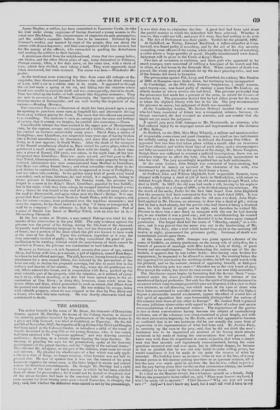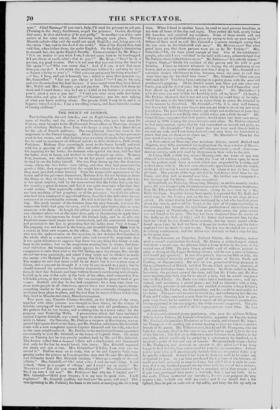THE ASSIZES.
The action brought in the name of Mr. Dunn, the treasurer of Drury-lane theatre, against Mr. Davidge, the lessee of the Coburg theatre, to recover the statutory penalties incurred by the performance of the regular drama in a place not duly licensed, was tried at Guildford, on Thursday. On the 8th and 9th of November, 1827, the tragedies of King Richard the Third and Douglas had been acted at the Cobourg theatre, to introduce a child of the name of Smith, described in the play-bills as the young Roscius, who,. it was stated, had been received with " rapturous applause," and was drawing crowded audiences ; therefore, to a certain degree injuring the large theatres. Mr. Gurney, in pleading the case fur the prosecution, spoke of the first-rate performances of the patent theatres, and the "dignity of the national drama." This afforded Mr. Adolphus, on the part of the defence, some room for retort and sarcasm. He pleaded the obsoleteness of a law which was only appli- cable to a state of .things no longer existing, when London was not half its present size. He was of opinion that it. was not the interest of the great houses to suppress the minor ones, as the latter helped to excite and extend a taste for theatrical entertainments. He thought Mr. Davidge had a right to complain of the hard and harsh manner in which he had been selected from all others for prosecution; for it could not be denied or disguised, that all the minor theatres had been in the constant habit of offending in the same manner for these twenty years past.—Lord Tenterden, in charging the jury, said, that W he t her the defendant were ruined or not by the proceedings,
it was their duty to administer the law. A great deal had been said about the partial manner in which the defendant had been selected. Whether it was so, they could not tell ; and even if it were, they had nothing to do with it. The Act of Parliament was their guide. Verdict for the plaintiff, 100/. At Guildford, on Friday, Edward Buckland, a tallow-chandler at Cam- berwell, was found guilty of assaulting, and by the aid of his dog severely wounding, some officers of the excise, while executing their duty of searching a cellar where a large quantity of goods illegally manufactured were found. Judgment will be given in the Court of King's Bench.
Two lads of seventeen or eighteen, and three girls who appeared to be much younger, were convicted of robbing a foreigner of his watch and I Gt. in silver, at a bad house in the Borough Mint. When sentence of death was passed, the whole party of criminals set up the most piercing cries, and one of the females fell down in hysterics.
The prosecution against Pitt, Levy, and Crawford, for robbing Mrs. Donkin of 300/. at Hampton races, broke down, her testimony being unsupported. At Cambridge, on the 30th July, Frances Stephenson, a single woman, aged twenty-one, was found guilty of stealing a mare from Mr. Lindsay, an elderly farmer in whose service she had lived. The prisoner pretended that the prosecutor had made her a present of the mare, in return for favours of another kind. The prosecutor denied that he had either given her the mare or taken the slightest liberty with her in his life. The jury recommended the prisoner to mercy, but judgment of death was recorded.
At the Cambridge Assizes, Mr. Justice Holroyd decided that a woman who had been convicted of felony was a competent witness, because, al- though convicted, she haul received no sentence, and non constat that she might not yet arrest the judgment.
A special jury gave 1504 damages to Mr. Wentworth, an attorney, who had suffered injury by an improper arrest and imprisonment at the instance of Mrs. Bullen.
At Stafford, on the 29th, Miss Mary Whately, a miliner and mantua-maker of respectable connexions and good character, was tried on two indictments for wilfully setting fire to her house, to defraud the County Fire Office. It appeared that two fires had taken place within a month after an insurance had been effected, and within three days of each Other, under circumstances not fully accounted for ; but in the opinion of the Judge, Mr. Baron Vaughan, though there was sufficient to warrant a judicial investigation, there was no evidence whatever to affect the lady, who had voluntarily surrendered to take her trial. The jury accordingly acquitted her on both indictments. At the seine Assizes, John Nough was convicted of horse-stealing, but recommended to mercy on account of the character of his wife, who threatened to poison him if he did not fetch home a horse. At Stafford, John and William Highfield, both respectable farmers, were charged with forging a deed of gift of lands in Staffordshire, with intent to defraud Joseph Peake, the nephew of an old Man named Joseph Ward, who died in 1819. In 1817, the old man had made a will, leaving to his nephew an estate, subject to a charge of 500t, to be divided ammbo, his relations. On the death of the uncle, Peake for the first time heard from John Highfield that the property had been conveyed to him by a deed dated 1818. It was proved, that in 1819, a few months after the old man was dead, John High- field applied to Mr. Preston, an attorney, to draw him a deed of gift; stating that lie had a deed already, but the person who had drawn it being a drunken man, his wife feared it might not be right, and therefore he wished Mr. Preston to draw him a new deed, to compare with • the one he had already got, to see whether it was a good one; and yet, notwithstanding he wanted it merely as a form to compare by, lie directed it to be drawn upon stamped parchment. The forged deed had the name of " Hawley, senior," as a wit- ness, and it was proved that the name was not in the handwriting of Mr. Hawley. The Jury, after a trial which lasted froin eight in the morning till twelve at night, pronounced the prisoners guilty. Sentence of death was immediately passed upon them. At the same assizes, 400/. damages was given against a farmer of the name of Griffiths, an elderly gentleman on the wrong side of sixty-five, for a breach of promise of marriage with Miss Leake, a lady of thirty, of great beauty and accomplishments. Notwithstanding the mature age of the de- fendant, it appears that he was rather fickle: after having once broken his engagement, he requested to be allowed to renew it ; the evening before the
day appointed for purchasing the wedding-clothes, he left his gold watch with the plaintiff, and on the morrow, instead of appearing himself, at half-past seven the following note was sent—" Abandon me as the very worst of men. Pray accept the watch, but detest its once owner. I am now truly miserable." The Dorchester report begins by lamenting that the Assizes there " com- menced under the worst possible circumstances for the interest of the members of the legal profession. Not only has the spirit of litigation decreased to
an extent which somethorough-paced lawyers are disposed, with a view to their own interests, to call alarming, but which must, in the eyes of those who
have been accustomed to consider actions at law as affording in the highest
degree a pleasurable mental excitement, appear the effect of a total loss of that spirit of opposition that once honourably distinguished the natives of
this country from those of any other in Europe." Mr. Justice Park is praised for some judicious observations with regard to the effect of a close and severe cross-examination of an unlettered witness. The expressions of the parties in two or three conversations having become the subject of contradictory evidence, one of the witnesses was cross-examined at great length, and with the most persevering ingenuity, by Mr. Earle, and at last appeared to become
so confused that in no two instances did he use exactly the same form of expression in his representations of what had been said. Mr. Justice Park, in summing up the case to the jury, said, that he did not think the man's testimony was to be impeached out account of his having made minute variations in his mode of stating the conversations that had passed. He knew very well, from his experience in courts ofjustice, that when a simple
man was thus severely and ingeniously cross-examined, having the same questions repeated over and over again, but in different shapes, he 'became at last so punted, that he was not only liable to make trifling errors, but
would sometimes at last be made to say quite the reverse of what he
intended. His lordship knew an instance, when he was at the bar, of a very learned person in this mauner putting questions to an ignorant witness, till at last the man was made quite to misstate the fact he was called to prove ; and the jury having given their verdict on that erroneous evidence, the matter was obliged to be set right by the revision of another court.
At a trial on the Munster circuit, for a felonious assault on a female, Judy Molony the prosecutrix being called on said, "Plume your honour, my Lord,! won't be ready till to-morrow." Chief Baron—" Why are you not ready now :" Judy—"! don't know any Lord, but I can't tell what Dian to say now." Chief Baron—" If you can't, Judy, I'll send the prisoner to ask you. (Turning to the Jury), Gentlemen, acquit the prisoner. Goaler, discharge that man; he does not look as if he was guiltil." In another case of the same nature at the same circuit, the following colloquy took place. Honora Mannitt called—She said she could not speak English ; and, beimg pressed, she swore "her soul to the d-1 if she could." One of the Grand Jury here said that, when before them, she spoke English. On the Judge's threatening to commit her, she spoke English fluently. Cross-examined by Mr. King- ""bt is no matter to you what I am, I am not come here to be humbugged. Ill am clever at cards, what's that to you ? " Mr. King—" Don't be in a passion, my good woman. But is it not true that you can bring the dead to life again ?"—" Who can swear that ? And if I can, is not that more than you can do ? 1 can make the neighbours believe it ; and may be it is as honest a living as your's." 6' Did you ever get money for doing wonders?" —" Yes, I have, and got it honestly too ; which is more than you can say, Mr. Counsellor." "Are not you clever at herbs ?"—" I am, to be sure, and can do more than the best doctors. I have cured were they have failed. Mrs. Walsh and Mrs. 1Iiggins can tell you that. The doctors left them for dead, and I cured them; may be I am as skilful in my business as you are in your's, great a man as you are." " Can't you take away milk and butter from cows, and give it to others ?"—" Nonsense ; you are now talking of what you know nothing about. The people think I can tlo it, and it so happens when I wish it.. I am a travelling woman, and have been the mother of twenty children."



















 Previous page
Previous page